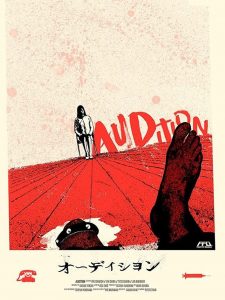 What’s that, you say? You want to see a really, really weird movie? Let me recommend Audition, in which an aging Japanese widower mocks up a TV show in order to get girls in to audition for one of the parts, when in reality they are auditioning to be his new girlfriend. And… well, the thing is, anything beyond the premise is a spoiler, including honestly the ways in which I have categorized the type of movie. But on the other hand, I’m pretty sure we both know you aren’t gonna go see this, so I am obligated to make this a conversation by elaborating. If you are in fact planning to see it, therefore, please disregard anything below this paragraph. (Oh, and my short answer is that it is worth seeing, I’m not trying to trick you over here.)
What’s that, you say? You want to see a really, really weird movie? Let me recommend Audition, in which an aging Japanese widower mocks up a TV show in order to get girls in to audition for one of the parts, when in reality they are auditioning to be his new girlfriend. And… well, the thing is, anything beyond the premise is a spoiler, including honestly the ways in which I have categorized the type of movie. But on the other hand, I’m pretty sure we both know you aren’t gonna go see this, so I am obligated to make this a conversation by elaborating. If you are in fact planning to see it, therefore, please disregard anything below this paragraph. (Oh, and my short answer is that it is worth seeing, I’m not trying to trick you over here.)
So, there are a number of open debate topics around the way the movie played out. First, there’s the widower guy. His whole plan sounds really damn creepy in a one-line sentence, no denying. And he is clearly entrenched in what is apparently Japan’s paternalistic relationship culture. But I couldn’t bring myself to look too unfavorably upon him, because despite his wealthy-version-of-a-stalker means, his heart really did seem to be in the right place. So I wonder if I’m taking that all wrong[1], and one of the points of the movie is that he did in fact deserve… well, okay, that’s too much spoiler even for me.
And then there’s our star auditioner, about whom… well, she is in fact my biggest open question. The only solid hints of her history we get seem to be from the perspective of someone else’s hallucination, so she is by and large a complete cipher to me. Does she believe herself wronged by, well, various people? Has she been extensively wronged in the recent and/or distant past? Is she simply insane? Is it a hefty combination of all of the above? Perhaps it’s okay that I don’t know, and perhaps, as per my footnote below, she plays a role instead of a character. I hope not, as it’s the same trap that her role is being used to punish, if so; just a different angle on it.
Anyway… by and large, the thought exercise presented here was better than the movie itself. Probably this is because it bucked my expectations via its near glacial pacing, and for no other reason directly related to the plotting or acting. But even if I’m objectively right, I will never call a movie that put this much contemplation into my brain anything less than good.
[1] For one thing, I started to say that there’s no counter-example in the film of someone interacting with the opposite sex on more equal footing[2], but then I remembered that his son seems to do fine. And while I will be the first to take notice of how meeting people only gets harder as time passes, there are still reasons to believe his counter-example is central to the themes of the film.
[2] Heh.
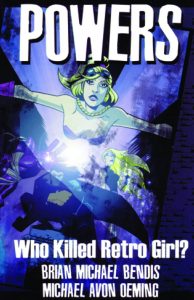 Here’s the thing. Either I (via listening to my friends and Amazon recommendations, it’s true, but in this case also on my own merits, since I bought it used and un-recommended) am really good at picking graphic novel series that I will like, or else I am a sucker for the format and just like any of them that I read. I don’t wish to test the theory by picking up something I expect to dislike and seeing how it goes; apparently because my happiness trumps science.[1] I’m not exactly sure how to tell you to calibrate your expectations when I don’t know which of the options is the truth, but at least now you know the pain I go through on a daily basis in trying to bring you as objective of a report as possible.
Here’s the thing. Either I (via listening to my friends and Amazon recommendations, it’s true, but in this case also on my own merits, since I bought it used and un-recommended) am really good at picking graphic novel series that I will like, or else I am a sucker for the format and just like any of them that I read. I don’t wish to test the theory by picking up something I expect to dislike and seeing how it goes; apparently because my happiness trumps science.[1] I’m not exactly sure how to tell you to calibrate your expectations when I don’t know which of the options is the truth, but at least now you know the pain I go through on a daily basis in trying to bring you as objective of a report as possible.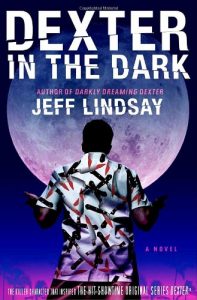 In a sense, one of the reasons I have been trying to read so many short, breezy, comfortingly familiar and above all known-quality books is that I’m girding my loins for literary battle; in other words, it’s about time for me to read another Anita Blake novel, and I’m by turns looking forward to the review and dreading the book itself. But also there are a stack of giant books I’ve been peering at, and then I think, nah, I’d rather read a lot of short books instead of that. I suppose once I finally catch up with the Ultimate Comics line from Marvel, I’ll feel better about long gaps in my books-reading too. None of which exactly explains how I pick what my next novel will be; I kind of just do it by feel, as opposed to the very structured method I have of graphic novel selection. All I really know is that my to-read pile is at least a hundred books deep right now, and that’s kind of unsustainable since it has consistently grown rather than shrunk, and so lots of authors but especially lots of series suffer delays as a result.
In a sense, one of the reasons I have been trying to read so many short, breezy, comfortingly familiar and above all known-quality books is that I’m girding my loins for literary battle; in other words, it’s about time for me to read another Anita Blake novel, and I’m by turns looking forward to the review and dreading the book itself. But also there are a stack of giant books I’ve been peering at, and then I think, nah, I’d rather read a lot of short books instead of that. I suppose once I finally catch up with the Ultimate Comics line from Marvel, I’ll feel better about long gaps in my books-reading too. None of which exactly explains how I pick what my next novel will be; I kind of just do it by feel, as opposed to the very structured method I have of graphic novel selection. All I really know is that my to-read pile is at least a hundred books deep right now, and that’s kind of unsustainable since it has consistently grown rather than shrunk, and so lots of authors but especially lots of series suffer delays as a result.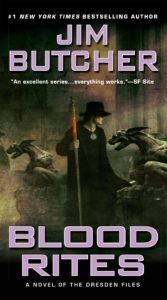 At some point between the last Dresden Files book and this one, I got accidentally spoiled for a piece of character development between Harry Dresden and Thomas Raith, a vampire of the White Court he’s been palling around with lately. (That is, of course, a drastic simplification and barely accurate at that, but so be it.) As such, it’s going to make it tricky for me to dig into the rich thematic ground here that I would and often have plumbed with great abandon for similar situations in other works. And while I could probably still kill this paragraph and start over in a theme-based review without letting you get spoiled by the character elements, these things are mostly more about me than the actual stuff I consumed, as you will have no doubt noticed by now.
At some point between the last Dresden Files book and this one, I got accidentally spoiled for a piece of character development between Harry Dresden and Thomas Raith, a vampire of the White Court he’s been palling around with lately. (That is, of course, a drastic simplification and barely accurate at that, but so be it.) As such, it’s going to make it tricky for me to dig into the rich thematic ground here that I would and often have plumbed with great abandon for similar situations in other works. And while I could probably still kill this paragraph and start over in a theme-based review without letting you get spoiled by the character elements, these things are mostly more about me than the actual stuff I consumed, as you will have no doubt noticed by now.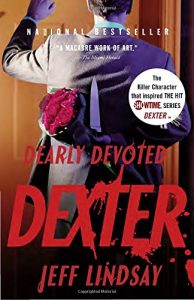 Man. I am way too far behind right now. It is not pretty. But, so anyway, I read
Man. I am way too far behind right now. It is not pretty. But, so anyway, I read